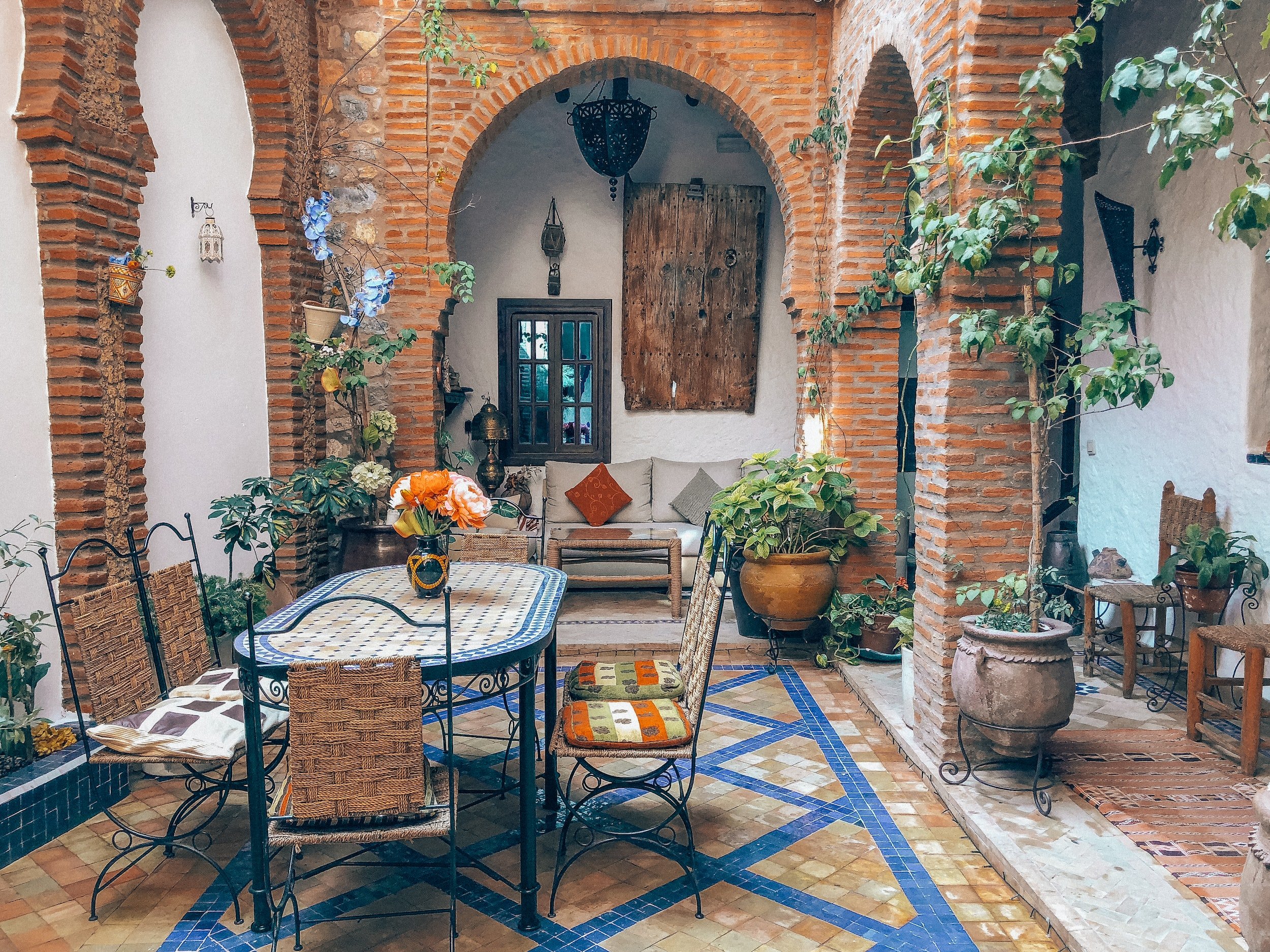Renting an Apartment in Morocco
The text from the landlord came out of nowhere, “Some things have come up and my family needs to move back into the apartment.” After overcoming the initial surprise, the two of us buckled down and started looking for a new place to occupy. The truth is that we had been planning to move sometime in the near future, but we were hoping to do that on our own terms. By the contract, we had two months to move out, but because of upcoming life events, we needed to move within the next month. Without going into all the details, we also needed to find a place in a different city to be closer to work. Thus began our process of looking for a new place.
The first time we rented an apartment in Morocco was immediately after completing a homestay with a Moroccan family. We had acquired about 3-4 months of language skills, but our conversational abilities were still lacking. Scouring the internet for listings, we found one within our price range and in a favorable neighborhood. Our language teacher was kind enough to call the number on the listing, and she arranged for our meet-up with the landlady. That same day we met the landlady who showed us the place. It was a two bedroom, 2 bathroom (kind of) apartment, located within walking distance of our school. As is common in Morocco, there was one bathroom with a toilet and sink, and another bathroom with the shower and sink (and maybe laundry appliances). How you count those bathrooms is up to you! The landlady’s daughter spoke very good English, so she translated for us all. We tried to negotiate the listed price by offering to pay early, multiple months at a time, etc, but the price stayed firm. This was not a problem as the price was within our budget. Upon agreeing, we met up again within the next few days to sign papers, pay, and receive the keys. This was the place we called home for the next two years, until we moved cities, and it was a place full of wonderful memories.
Chances are, if you are reading this article then you are curious about renting a place in Morocco. Here is some helpful information as you go about this process.
Everything You Need to Know about Renting a Home in Morocco
Listings - Many locals will likely say to go to the neighborhood you like and ask people who live there if they know of any vacant places for rent. This probably makes for a great cultural experience. You can also ask a friend to help you, and he or she will dip into their vast relational network to find a number of available places. However, most Westerners are probably inclined to check online. The good news is that there are multiple online sites where you can find available places; avito.ma, mubawab.ma, and sarouty.ma all contain listings for apartments to rent (or to buy). Of the three apartments we have found, all of them were on these sites. While there are phone numbers and Whatsapp numbers listed on these sites, you will find that some people only respond to old-fashioned phone calls. This was the case with our current apartment, as numerous attempts at Whatsapp were ignored, but the phone call got an immediate showing.
Furnished vs. Non-Furnished - In Morocco you can find places that have furniture and places that come without. Our first apartment was furnished, which means we paid a little more per month but also meant we didn’t have to buy furniture and appliances. Over the time we lived there, we did purchase a few extra things. One of the down-sides of a furnished place is that you have to be comfortable with the style. For the first place, we made do. However, for our second place we negotiated with the landlord to use some of the furniture and appliances. As a result, we found a middle ground on rent payment that was essentially “semi-furnished.”
Furniture and Appliances - An unfurnished apartment means completely empty—there will likely be no hot-water heater, no AC units, no stove or oven, no refrigerator, just completely empty. So if you need to buy appliances in Morocco, the easiest thing to do is purchase from one of the large chain stores, like Marjane. They will do free delivery (usually within 24 hours), and in instances like AC units, they will provide mostly free installation (you just pay 100 MAD per unit). Of course, with ease comes cost, so you may end up paying more for your items than if you were to visit smaller furniture and appliance shops. In terms of buying furniture, many people are surprised to hear that IKEA is in Morocco; currently there is one large location just outside Casablanca, with a smaller one inside the Morocco Mall. Another location is being built in Tetouan. In general, our experience with IKEA in Morocco has been good. You can order online, and for only 100 MAD they will deliver to most (if not all) places in Morocco. However, you may find that not all items are available to purchase online, which necessitates a trip to the large store. In terms of a horror story, we once waited over a month to receive an online purchase, and the communication from IKEA during that period was severely lacking. Another story (and last), is that IKEA does not easily accept returns. Recently we purchased a barstool that ended up being the incorrect size. It was in perfect shape other than it was too big for the kitchen island. As hard as we tried to return the item, IKEA would not take it back because the item was not defective. While we have no personal experience shopping there, KITEA is a Moroccan store quite prevalent in the country; it may be suitable for your furniture needs.
Negotiating - We have never had any success negotiating a lower price than what’s been listed online. You can try your best to offer more upfront money, or to pay early, but my experience is that none of these techniques lowered the price. In a different scenario, I did negotiate with a landlord, but there was also no listed price; in that scenario, he said a price, I countered, and we continued on until we found a price we could all agree on. So perhaps there is a difference between listings that have a set price and listings that are more informal.
Paying - You are going to pay at least the first and last month’s rent. If there is a realtor involved, then you are going to pay him or her the equivalent of one month’s rent. Additionally, you may be asked to pay some sort of a deposit. Because Morocco is primarily a cash-based society, you are likely going to pay in cash. However, more people are getting accustomed to using online banking, so it may be possible to pay your monthly rent online. Because we like to be good tenants, we try to pay by the end of the month or before. I have heard that you have up until the first 5 or 6 days of the month to pay, but I prefer to pay the owner sooner than that. I find that the owner is more likely to help out when I am paying on time. When negotiating and working through the contract, it may be helpful to discuss with your landlord or landlady how maintenance works. When we rented a furnished apartment, the landlady was very prompt about responding to problems and paying for them herself (like when the washing machine broke). However, if you end up renting a non-furnished place, you will likely end up paying for most repairs and maintenance.
Contract - Once you’ve agreed with the landlord or landlady to rent the place, a rental contract will be written up and you will go to the muqata’a to sign it. If you are planning to apply for residency in Morocco, then it is necessary that the contact state that it is automatically renewing. Our first contract was for 6 months, but more commonly contracts are written for 1 to 2 years. With a renewable contract, it means that after the initial time period is over, the agreement will continue without having to sign another. In terms of rent control, the contract may state this specifically. Generally the price is required to stay the same for three years, at which time the owner can only raise the price by a certain percentage - either 8 or 10%.
Utilities - The name of the utility company varies depending on the city where you are renting. In Casa, it’s Lydec, and in Fes it’s Radeef. The utility company handles both water and electricity. If you are applying for residency, then you will need to present your most recent utility bill with your paperwork to demonstrate that you are actually residing in the building. Our experience so far is that this utility bill does not need to have your name on it; most commonly the landlord or landlady’s name will be on the bill. In one instance we paid the landlady in cash for the utilities; in other instances, we have been able to link up our online banking to the utility bill and pay online (super convenient!). At times you may need to visit the utility company’s office. In Casablanca I was very impressed with the modern numbering system used for people waiting; once you explained your purpose of visit at the front door, you were handed a numbered ticket and waited until your number showed on the screen. In Fes, there seems to be a similar system.
Fixtures - While not specific to utilities, something that may surprise you in Morocco is the appearance of exposed wires and lightbulbs. When renting an unfurnished place, you should expect that there will be little to no light fixtures. As a result, you will need to purchase your own fixtures and either install them yourself or hire an electrician to help. The cost of an electrician varies from city to city, with Casablanca being expensive. In Casablanca, the electrician charged 100 MAD per fixture to install. In Fes, the electrician worked more at a set hourly rate, and actually didn’t give me a price, but said I could pay however I liked (that’s a fun cultural experience!). When I asked friends what would be a normal price, they said about 100 MAD per hour. In my specific situation, an electrician worked at my house for 3 hours, and had two helpers for over half that time, for a total price of 500 MAD. If you find yourself in a situation where the price is not set, then it helps to err on the side of generosity. Otherwise you may find yourself upset with the experience.
Renting an apartment in Morocco is pretty straitforward when you know how the process works. Let us know if you have any questions or if there is anything we missed.
Moving to Morocco? Do you need to be able to get around and navigate life in Morocco?
Study Moroccan Arabic online or in-person in Morocco. We offer flexible scheduling and a structured learning approach that focuses on communication and cultural awareness.
Related Articles









Humility and a learning spirit are two critical elements to operating a company as a foreigner in Morocco. The learning process for anything can be hard, and learning to operate a business is no exception. Operating a business will vary from city to city, with rules and regulations required in one city but not in another. Below are some ideas to make your business experience a little easier.